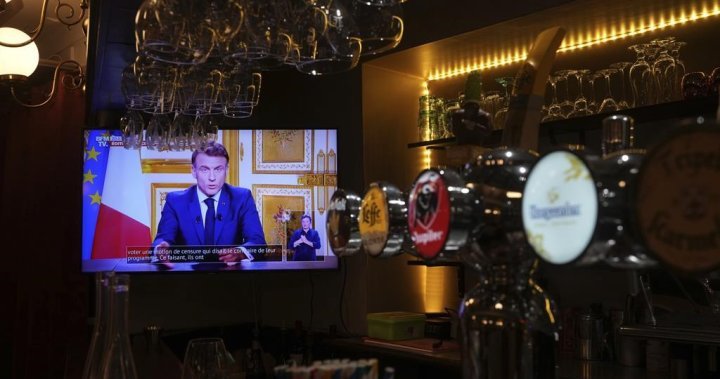Physical Address
304 North Cardinal St.
Dorchester Center, MA 02124
Physical Address
304 North Cardinal St.
Dorchester Center, MA 02124

President of France Emmanuel Macron vowed on Thursday to stay in office until the end of his term, which is due in 2027, and said he would name a new prime minister within days in an effort to break the political deadlock following the resignation of ousted Prime Minister Michel Barnier.
Macron was fighting a day after a historic no-confidence vote sparked by budget disputes in the National Assembly. France without a functioning government. He blamed his far-right opponents for toppling Barnier’s government.
“They chose disorder,” he said.
The president said the far right and the far left had united in what he called an “anti-Republican front” and stressed: “I will not accept the irresponsibility of other people.”
He said he would name a new prime minister within days, but gave no hint as to who that might be.
Earlier, Macron “took note” of Barnier’s resignation after just three months in office, the shortest tenure of any prime minister in modern French history.
Macron admits his responsibility
While criticizing his political opponents, Macron also acknowledged what he described as his own responsibility for the chaos currently rocking French politics and jittery financial markets.
He revised his June decision to dissolve parliament. This led to a crisis that led to legislative elections that resulted in the now-hung parliament, split into three minority blocs that do not have enough seats to govern alone.
“I understand that this decision was not understood. Many criticized me for this,” Macron said. However, he argued, “I believe it was necessary” to let French voters speak.
The next priority is the adoption of the budget law
Macron said the new prime minister “will be tasked with creating a government of general interest.”
He confirmed that a special law will be introduced by mid-December to allow the state to collect taxes from January 1 based on this year’s rules and avoid a shutdown.

Get the day’s top news, politics, economics and current affairs headlines delivered to your inbox once a day.
“Public services will work, businesses will be able to work,” he said.
The new government will then prepare a budget law for 2025 that will allow France to invest as planned in its army, justice and police, as well as support struggling farmers, Macron said.
How to achieve the “impossible”
Along with its domestic political and financial difficulties, including France’s rising debt levels, Macron noted that the country faces a number of international challenges, citing the wars in Ukraine and the Middle East.
He looked back to the Paris Olympics in July and August and the opening of Notre Dame this weekend, arguing that France can emerge from this latest political crisis if it puts its mind to it.
“This is proof that we know how to do great things, that we know how to achieve the impossible,” he said.
“Twice this year the world has admired us for it,” he said, referring to hosting the Olympics and restoring Notre Dame. “Well, as a nation, we have to do the same.”
Macron faces the critical task of naming a replacement for Barnier who can lead a minority government in a parliament where no party has a majority. The president of the National Assembly and a member of Macron’s party, Jal Brown-Pivet, urged the president to act quickly.
“I advise him to quickly decide on a new prime minister,” Brown-Pivet told France Inter radio on Thursday. “There must be no political hesitation. We need a leader who can talk to everyone and work to pass a new budget bill.
The process can be complicated. French media have reported a slate of centrist candidates that could appeal to both sides of the political spectrum.
Calls for Macron to resign
The no-confidence vote has galvanized opposition leaders, with some clearly calling for Macron to step down.
“I believe that stability requires the departure of the President of the Republic,” Manuel Bompard, leader of the far-left France Unbowed party, told BFM television on Wednesday night.
The leader of the far-right National Rally, Marine Le Pen, whose party has the most seats in the Assembly, stopped short of calling for Macron to step down, but warned that “the pressure on the President of the Republic will become stronger and stronger”.
The French constitution does not allow the president to resign after his government is overthrown by the National Assembly. It also said new legislative elections could not be held until at least July, creating a potential deadlock for policymakers.
Economic uncertainty prevails
Political instability has fueled concerns about the French economy, particularly its debt, which could rise to 7% of GDP next year without major reforms.
Analysts say the fall of Barnier’s government could push up French interest rates, further eroding the debt.
Ratings agency Moody’s warned late on Wednesday that the fall of the government “reduces the likelihood of consolidation of public finances” and worsens the political deadlock.
The teachers’ protest has a political tone
A planned teacher protest against education budget cuts took on a new tone on Thursday as demonstrators in Paris linked their demands to the political crisis.
“Macron quits!” read the sign held by Dylan Quenon, a 28-year-old teacher at the high school in Aubervilliers, just north of Paris.
Quenon said Macron was responsible for what he described as the elimination of public services such as schools. “The only way to change that is to get him out of office,” he said.
Protesters expressed little hope that Macron’s next candidate would reverse course.
“I’m happy that this government is falling, but it could possibly lead to something worse,” said Elise De La Gorce, a 33-year-old teacher from Stains, north of Paris.

